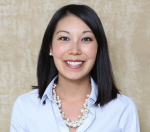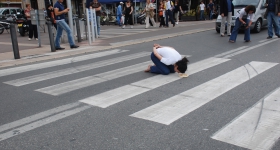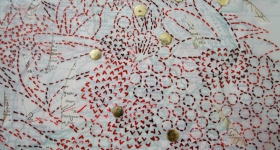From a storyline perspective, I noted a few junctures in the plot and wondered if you could comment on what you were thinking as you wrote them. First off, the argument about “elevated Asian cuisine.” That struck me as a conversation that has been playing out in various settings; whether or not elevated Asian cuisine is “selling out” according to some. Can you talk about how that writing came to be and what you wanted to convey?
Ali: Food is something we’ve been getting asked a lot of questions about — what kind of role food plays in the film — and for Sasha, food is certainly a way for her to express herself creatively, and it’s also a way for her to sell out and also a way for her to come back to herself. And so, you know, she’s with this guy whom she loves and she challenges him but he’s also challenging her. You don’t see anyone talking to Sasha like that. Marcus is a nice guy and he’s comfortable and he’s kind and he’s good with where he’s at, but he’s got a backbone of steel and he just keeps telling her the truth. He’s trying to force her to grow but she’s also forcing him to grow, too.
Randall: Regarding that debate, I don’t think we consciously were taking a stance on it. I think it was basically just these two characters with different viewpoints and Sasha kind of coming around at the end to understand Marcus’ side and even take his side a bit, but it doesn’t mean her other restaurants are changing. She’s still doing what she does but also expanding what she does and bringing it back home and being kind of more of herself, which is kind of a little bit of everything. And that’s what Marcus does too at the end. He becomes more of himself and expands upon himself and that’s how the two characters meet in the middle.
I was also struck by the reversal of traditional roles with Ali on top. Was that intentional? What were you thinking when you wrote that portion?
Ali: I think that was just a character that we just don’t see that much that’s grounded. Nahnatchka (the director) had said this last night at the screening. She’s not someone in shoulder pads, running around and yelling at everyone. She’s a grounded, powerful woman and she’s obviously someone that in a lot of ways I hope a lot of women can relate to. But she’s into him and she’s the one who makes the speech to him, first, and that’s, I think, something we haven’t really seen before. She expresses how she feels first and he rejects her.
Randall: But it was also important for us to not make Marcus a low status character; even though he still lives at home and plays with the same band, it was important that he be happy and confident.
Ali: You don’t want the audience to be like, "Don’t pick him, girl!" You want the audience to be like, yes, even though these two are so different, they complement each other and lift each other up and belong together. Combining the balance of this wish fulfillment but also the reality of who these characters are. I think the audience will want to be with Marcus at the end.
What got you guys together on this plot and project?
Ali: Randall and I have been friends for the last 16 years and this is one of many things we’ve collaborated on. Not as intimately as this, but we were in an improv troupe together. Another lifetime ago, Randall did standup and he was FANTASTIC at it!
And after college, I moved back to San Francisco and he would come visit me and I would take him out and we would do standup spots together and we always kept in touch and were intending to collaborate on all sorts of different projects.
After Baby Cobra was released, Ariel Levy at the New Yorker did this profile piece on me and she asked what I wanted to do next, and I casually mentioned that Randall and I had always joked about doing our version of When Harry Met Sally. Shortly after, Vulture wrote this letter to Hollywood begging them to make this movie and then all these other people kept doing the same. And then afterward we kept on getting asked by studios, "We’d love to see the script, where’s the script?" and we were like, "We don’t have the script!"
And so then we just got to writing and it was so easy and Michael Golamco — we were lucky that he was available to write it with us. And Netflix wanted it from the get-go. I still remember this meeting I had with Scott Stuber and there was a little bit of small talk, but then he was like, "I’m just gonna cut to the chase … we want it!" And then I still remember I was doing my impression of Wonder Woman and he said, "Okay, that’s enough of that." I was so excited, I was doing martial arts on this conference table [laughing].
Everything we’ve done in between has been so much fun. Sometimes I get concerned when we talk. It’s like we’re speaking another language and other people get really annoyed and they’re just like, I’m just going to leave while you two do your comedy hieroglyphics.
We were really lucky that we had asked Nahnatchka to come help us in the writing and would hand in outlines to her and get notes from her throughout the process. Then when she was available to direct because this other feature she was supposed to direct fell through, we were like, "YES!" And we put a black bag over her head and tied rope around her and dragged her to the Netflix offices and said, "Pay her money!"
Nahnatchka: I woke up in the parking lot of Beard Papa and was like … what happened? [laughing]
As one of the most well-known female Asian American entertainers in the United States, do you have any advice for aspiring female Asian actors? How do you feel your experience as an Asian woman has shaped your career?
Ali: I mean, I just have these really close friends from college and they’re all like Filipino and Chinese, and we’re all still really close and they kept me really grounded throughout the years. And they work in social justice and all these professions totally outside of entertainment and I think that the work they do and the conversations I have with them are so important in my personal life but also important in informing all of my work. They keep me grounded.
I think I’m really entranced and always intrigued by other Asian American women and when they’re smart and beautiful and funny and powerful I think there’s nothing more magical than that.
Same question for Randall. Could you talk some about some of the experiences you’ve had with discrimination as an Asian male actor? How have you gotten to where you’ve been?
It’s a tough thing coming up and you don’t want to … you want to acknowledge that stuff because it’s real, but you also don’t want to dwell on it and you almost don’t want to think about it too much because you can’t control it. And I think it’s important when you’re coming up in any sort of artistic field to stay focused on what you bring to the table and work on that. And find opportunities to put that out into the world. At the moment you start convincing yourself that the world won’t give you those opportunities, you’re kind of done because you can’t do it anymore, as opposed to just constantly doing stuff. So, it’s kind of that fine line but at the same time all of that is out there, but you can’t let that hold you back. You’ve got to keep at it. That’s kind of my theory and sometimes it feels like I’m shielding myself from thinking about stuff or trying to live in a bubble but it’s really about trying to preserve. It sounds corny, but preserve the art and the opportunities to express yourself.










Comments